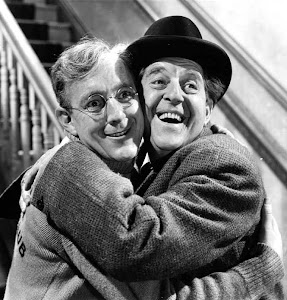
Ooooohhhh, I loves me some in control of the situation Ben, as he is here from Meet Kevin Johnson. I guess that's one way to get your daughter's boyfriend out of the way......
Screencap via Michael Emerson.net (thanks Edith!)
I've lived on this Island all my life.






Classical music should not be scary, he says, "but so many things surrounding it are almost designed to intimidate. The sense that it's hoity-toity -- you have to dress up, know when to clap -- is, in a weird way, foreign to the music itself."How is that any different from being a normie at a hardcore death metal concert or a drunken lout at a mostly acoustic singer-songwriter gig at a club? There's norms of dress, behavior and so forth at those events that are just as rigid as at a Cleveland Orchestra concert, but somehow the ones attendant to classical music get portrayed as this stifling straight jacket at Severence Hall.
Based at Lincoln Center, Kapilow began his musical mission because, as a conductor, "all I wanted to do was turn around and say, 'Did you hear that? Isn't that a beautiful chord?' But if you did that, they would cart you away".Yikes. So, Mr. Kapilow, would you prefer the good kicking before or after they cart you away? I know that the sub-Lenny music proselytizers rely on endless supplies of enthusiasm and "golly gee Beav!" good cheer, but damn! it's not about you. It's about the music, full stop, you should be striving to remove your ego from the process as much as possible, not place it front and center.
But I think that Strauss failed to use his abilities to achieve what the best music does, which is to really touch the core of humanity and bring the audience to a higher experience of it.Oh dear, how to unpack that? After a cursory look-see at Pentimento's blog, I suspect that what she means is "Strauss' music doesn't put us in contact with The Divine", which leaves me absolutely cold, having been an atheist since I was 12. Good for Strauss, who loathed religion, I say! I replied in Pliable's comments:
It's probably just me, but if I'm told that a piece of music is "uplifting" or "touches the core of what it is to be human", I run as fast as I can from it. I look for two things from music:It's really the old Sibelius/Mahler conversation about the symphony, isn't it?:
1. Tickle my ear with interesting sounds
2. Engage my intellect via form, harmony etc.
On those counts, Strauss succeeds in spades. I don't listen to music as an exercise in self-improvement, but as music.
Well ... yes, it is, [just you] Henry, as least as far as I'm concerned.Well, I'm silly a lot of the time, absolutely cynical to the bone and reject the idea of a soul as religious hokum. So........it's a fair comment, I'd say!
It strikes me as a marvelously silly and cynical conceit to dismiss a piece out of hand simply because someone has been touched by it beyond interesting sounds and technical ingenuity.
It sounds to me like a singularly cold and soulless manner in which to live. But to each his own.
Note that I'm not saying that Henry Holland is silly or cynical or soulless; I have no idea whether he is or not. I'm just saying that his comments strike me that way.
"Shostakovich plays with clichés most of the time… It's like olive oil, you have a second and even third pressing, and I think of Shostakovich as the second, or even third pressing of Mahler. …with Shostakovich, people are influenced by the autobiographical dimension of his music"Ouch. As Monty Python might say, "Cruel, but fair". It was interesting that Esa-Pekka Salonen, to much fanfare, initiated a Shostakovich festival about 6-7 years ago, because a) he was Music Director of a symphony who b) had never really conducted Shostakovitch's music, so here was his chance. There were to be three symphonies performed each year, with the numerically corresponding string quartets played in the public areas beforehand. I think that Mr. Salonen lasted one season (alas, Google is no help and I've long gotten rid of the programme) before he bowed out (the first of the three was the Fourth, I think; I still remember the second concert in the series, containing the absolutely ghastly 2nd and 3rd symphonies). I believe his comment when it was quietly announced that he wouldn't be continuing the project he initiated was "Well, his music is interesting" in that way where "interesting" = "is really bad".
The work also calls for two conductors -- one for the large orchestra and one for the chamber orchestra -- although there have been performances under the leadership of a single person. "I have conducted both orchestras," Maazel said, "and it was doable. But I felt it was defeating the purpose of the score, and I was very happy to go back to the source and follow the composer's instructions. [snip]That's admirable, one assumes the composer knows best what they want. Oh wait.... (from earlier in the article):
Britten called for a chorus of boys' voices, but here, as often elsewhere, the chorus will be mixed. "This was requested by maestro Maazel," said Anne Tomlinson, director of the children's chorus. "He prefers the sound of a mixed ensemble".
